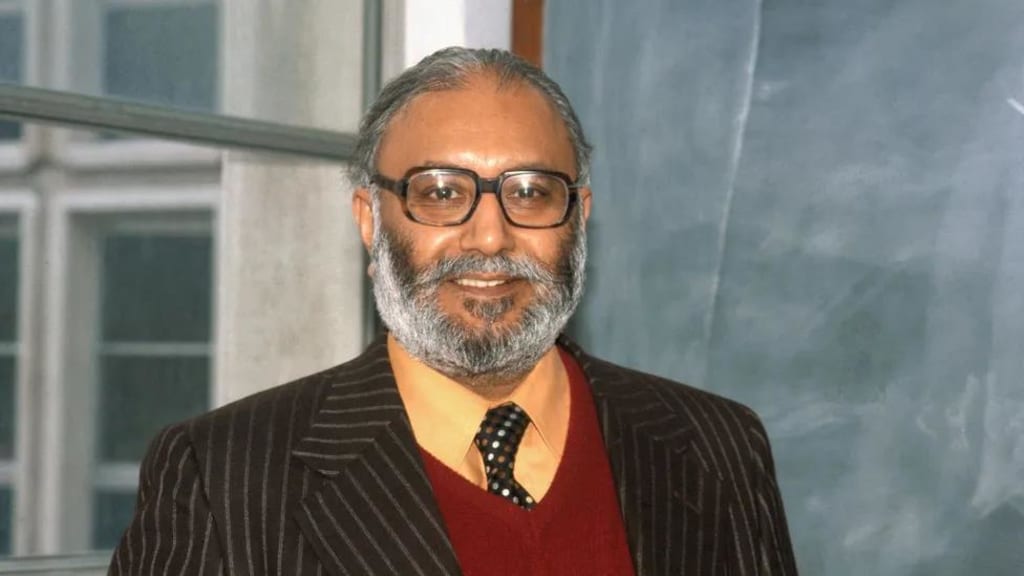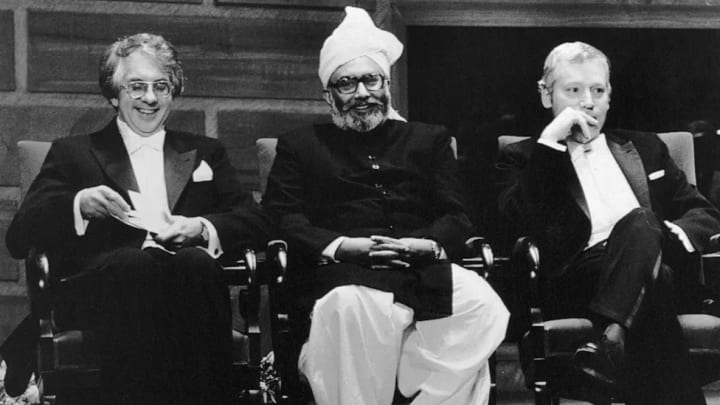Abdus Salam: The Muslim science genius forgotten by history
The Pakistani physicist’s work led to the discovery of the Higgs boson, but he was disowned in his home country for his faith. Now a Netflix film is putting him back in the spotlight.

In 1979, Pakistani scientist Abdus Salam won the Nobel Prize for physics. His life’s work was key to defining a theory of particle physics still used today, and it laid the groundwork for the 2012 discovery of the Higgs boson – the particle responsible for giving all other particles mass.
Salam was the first Pakistani to win a Nobel, and his victory should have been a historic moment for the country. But instead, 40 years on, his story has largely been forgotten by the country in which he was born – in part because of the religious identity he held so dear. Now a new documentary on Netflix, Salam, The First ****** Nobel Laureate, is seeking to bring Salam and his achievements back into the spotlight.
“Salam was the first Muslim to win a Nobel science prize,” Zakir Thaver, one of the film’s producers, tells BBC Culture. “[He] was so committed to his roots and bettering the plight of his people that he wore a turban in Stockholm to receive the prize from the King of Sweden.” During his speech at the Nobel Banquet, Salam quoted the Koran.
The film portrays Salam’s unwavering dedication, in the face of testing circumstances, to three things: his physics, his faith and his nationality.
Story continues below
Salam stood out right from the moment he was born in 1926 in the city of Jhang, then part of British India. His father, a teacher, believed Salam’s birth was the result of a vision from God he had received during Friday prayers, and so growing up, Salam was treated as a superior being to his siblings – made exempt from household chores like milking the cow and emptying the toilet area, and afforded time to work on his astounding skills in mathematics. Yet his childhood was not a particularly luxurious one. When he left his city to attend Government College University in Lahore, it was the first time he had seen an electric light.
There, Salam’s skills in mathematics and physics set him apart from his classmates. He won a scholarship to attend Cambridge University, where he became one of the few South Asian faces at the time in St John’s College. But the pull of home was strong: after completing a doctorate at Cambridge, he then moved to Lahore to work as a Professor of Mathematics.
Reconciling science and religion
Throughout his life, Salam was a dedicated Muslim. He listened to the Koran on repeat while he worked in his office in his London home. He never saw his religion as a barrier to his science. In fact, he saw them working together, and claimed to colleagues that many of his ideas came to him from God. He was striving for a unified theory that would explain all of particle physics, which was in line with his religious beliefs. “We [theoretical physicists] would like to understand the entire complexity of inanimate matter in terms of as few fundamental concepts as possible,” he once said. But he accepted that there were areas of science that did not fit easily with his beliefs – like the Big Bang theory.
While his faith was deeply important to him, it was also a source of great pain, thanks to the way in which his particular sect of Islam, the Ahmadiyya Muslims, has been treated in Pakistan. The Ahmadiyya movement was formed in 1889 in Punjab, in British India. Ahmadi Muslims believe their founder, Hazrat Mirza Ghulam Ahmad, to be the expected Mahdi and Messiah. However other Muslims do not agree, and instead they believe they are still waiting for him. “The Ahmadiyya Muslim Community is a law-abiding, loving community,” says Adeel Shah, an Ahmadi Imam based in London. “However, it has been subject to various forms of persecution and discrimination especially in Pakistan.”
In 1953, the trouble really began for the Ahmadiyya Muslim community with a series of violent riots in Lahore against the movement. The Punjab government inquiry found the official death toll from these riots to be 20 people, but other estimates put it much higher, some in the thousands. A law passed in 1974 declared Ahmadis to be non-Muslims, and deprived them of their rights. As recently as 2010, two Ahmadi mosques in Pakistan were attacked, with 94 people killed and more than 120 injured.
The first Muslim to win the Nobel Prize in science had the very word ‘Muslim’ whitened out from his gravestone – Zakir Thaver
“Even now, if an Ahmadi Muslim was to use an Islamic salutation [in Pakistan] he or she could be imprisoned for three years and this would be considered lawful,” says Shah. “Ahmadi Mosques are damaged, Ahmadi graves are desecrated, Ahmadi shops are looted and most of the time, the state turns a blind eye to what is happening.”
After the riots in 1953, Salam decided to leave Pakistan. He returned to Cambridge for a few years, before moving to Imperial College, London, where he helped set up the theoretical physics department. Despite the rejection from his home country he had suffered, he did not let Pakistan go, continuing to be involved in the country’s most prominent scientific projects. In 1961 he established Pakistan’s space programme while during the early 1970s, Salam was, controversially, involved in Pakistan’s efforts to build a nuclear weapon. But after the Prime Minister Zulfikar Ali Bhutto passed the law against the Ahmadiyya Muslims in 1974, Salam’s involvement with the country’s administration finally diminished. He went on to be outspoken against nuclear weapons.

In 1979, just five years after the law had been passed in Pakistan declaring him non-Muslim, Abdus Salam became the first Pakistani to win a Nobel Prize. To the world, he was the first Muslim to win a Nobel Prize in Physics. But in the eyes of his own country, he was not.
On Salam’s gravestone, in the Pakistan town of Rabwah, he was described as the first Muslim Nobel Laureate, until local authorities scrubbed out the word ‘Muslim’. Thaver says they decided to replicate this defacement in the title of their documentary “as therein lies the story as well as the irony, the tragedy,” says Thaver. “The first Muslim to win the prize in science has the very word ‘Muslim’ whitened out. It’s the final affront to the most illustrious son of the soil.”
Unearthing a legend
Thaver says he and his co-producer Omar Vandal only learnt about Salam when, in the mid-’90s, they moved from Pakistan to the US to study at university. “We read Salam's obituary in the New York Times. Back home his story had been buried.”
Reading more about Salam, the pair discovered his story was buried in part because of his religion. “We became aware of the amazing potential Salam's story of humble beginnings had to inspire people to pursue science, and since have learnt of many who in fact have derived inspiration from his story,” says Thaver.
Salam’s contribution to physics was significant. He developed the theory of the neutrino, a subatomic particle first proposed by Pauli in 1930, and he worked on electroweak theory, for which he won the Nobel Prize.
Electroweak theory is fundamental to the Standard Model, which describes the smallest, most fundamental building blocks that make up all matter, called elementary particles, and how they interact through three different forces: electromagnetism, and what are known as weak and strong ‘interactions’. Salam worked on combining the theories of the electromagnetic and weak forces into one.
Despite his persecution, Salam’s dedication to his country and the people of Pakistan did not waver. He was offered British and Italian citizenship, but remained a Pakistani citizen until he died. Imam Adeel, who was also born in Pakistan but moved to London because of discrimination, says this is because of the Ahmadi way of thinking. “Ahmadi Muslims, including myself, still hold great love for Pakistan and will always be at the forefront of serving their nation whenever it calls them,” he says.
Beyond supporting his country, meanwhile, he was also passionate about promoting scientists in the developing world. To that end, in 1964 he founded the International Centre for Theoretical Physics (ICTP), in Trieste, Italy, specifically to provide a place for students from developing countries to connect with academics from around the world.

Piecing together the film detailing his life took Thaver and Vandal 14 years. “We were unknown, young, foolishly ambitious, aspiring filmmakers, and had set out to do something significant and hopefully historical,” he says.
The film features extensive archive footage, including of Salam, much of which has never been seen before. “It took a lot of time and effort to restore, catalogue and transcribe all our archives,” Thaver says. “We edited for almost two years.”
The pair filmed people who had never spoken on camera before, including Professor Salam’s secretary from the ICTP. “The family opened up their homes, so we could go through notebooks and hunt down old family pictures and video,” he says. “When you spend over a decade on a project, people want to be a part of your journey and help you out.”
Ahmad Salam, Salam’s eldest son, who appears in the film to talk about his father’s life, describes it as “a wonderful film made by two very dedicated, committed young men, who wanted to tell the unique story for the benefit of 200m fellow countrymen, most of whom have never heard of Abdus Salam,” he says.
Abdus Salam strived to make developing countries invest in education, science and technology – and that message is as relevant now as it was 50 years ago – Ahmad Salam
Footage in the film reveals a side of Salam never seen before. His old colleagues reveal the quirks of his research habits, explaining how he would come up with endless ideas – the majority of them eccentric but a vital few worthy of a Nobel Prize. His son Ahmad describes him as fiercely loyal. Once, he says, when Salam needed a suit tailored last-minute, the shop he visited made special arrangements to have it ready for him in time. He continued to buy suits at that shop for the rest of his life.
However, Ahmad says, part of the story is missing. “It focuses on Pakistan, and sadly therefore it doesn’t have time to explain Abdus Salam’s passion and anger to help overcome the greed and arrogance of the developed countries towards the developing countries,” he says.
Since the idea for the film was born, the documentary has become more and more important, says Thaver.
“In the early days, we felt it was an important story to tell because of its power to inspire children back home and to educate about a Pakistani, Muslim Nobel Prize winner who was an unsung hero,” says Thaver. “Over the years the plight of religious minorities in Pakistan, as well as the sub-continent at large, has worsened, and that’s given greater present-day significance and relevance to the story.” On top of this, he says, rising Islamophobia in the West makes Salam’s story even more relevant by celebrating Muslim achievement, particularly in science, where the Islamic world’s contribution has been underappreciated.
“Inequality in every sense is higher now than ever in history,” says Ahmad. “Abdus Salam strived to make developing countries invest in education, science and technology to help their economic prospects, whereby they would grow faster and more sustainably with the support of the developed countries. That message is as relevant now as it was 50 years ago.”
About the Creator
Many A-Sun
Where your interests lie, that's where your abilities lie.






Comments
There are no comments for this story
Be the first to respond and start the conversation.